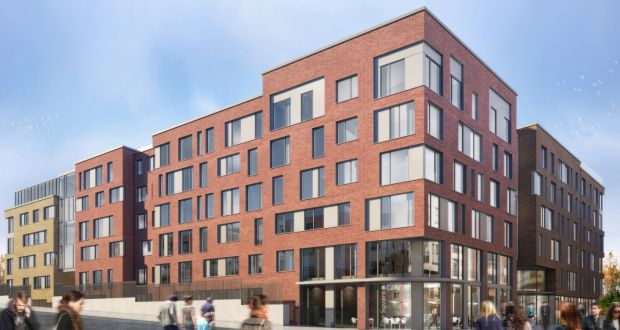Trinity is set to make a significant loss on the beds it has leased in Kavanagh Court. This comes after the College was unsuccessful in filling all the beds it had agreed to underwrite in the private accommodation complex.
The private company Uninest Student Residences owns the building, along with Broadstone Hall and New Mill complexes. The prices for students range from €180 to €345 per week.
The rent prices of the company’s accommodation were condemned by Trinity College Dublin Students’ Union (TCDSU) in September after an email from College was sent to students to advertise the €9,000-per-year accommodation in Kavanagh Court.
The apartments in Kavanagh Court normally have four to six bedrooms and a common area, with the rent priced at €239 per week – advertised as “a special rental level” negotiated by Trinity.
Speaking to The University Times, Kevin O’Kelly, the Dean of Students, gave reasons why Trinity struggled to fill the beds. “In principle it came down to the fact that literally the scaffolding only came down in September. So, Trinity was not ready to sign a lease until it was clear that the building was available”, he said.
O’Kelly went on to explain that for students, both Irish and international, this was too late. He said that “international students need that information in April or May” and that most Irish students “will not wait until September” to secure accommodation.
He described the situation as “very frustrating” and said that once Trinity signed the lease, there was a “scramble” to fill the beds.
In an email statement to The University Times, Trinity’s Chief Financial Officer, Ian Mathews, said that the unfilled beds in Kavanagh Court – a situation “which came to light in recent weeks” – mean that Trinity does not expect to “achieve its forecasted overall student accommodation income target” for this academic year.
Mathews declined to confirm how much money Trinity would lose from the unfilled beds.
Mathews went on to explain that a “significant amount of resources have been deployed by the Commercial Revenue Unit and other areas to market and fill the available accommodation given the perceived shortage of students bed spaces”.
The “main concern” for O’Kelly was that “empty beds could be interpreted as a decrease in demand” by College. He added that this “is not a problem that is going to exist going forward because now we have that lease”.
However, the President of TCDSU, Kevin Keane, said at a meeting of Students Against Fees last week that “Trinity will not be going down that route again in the future” of leasing Kavanagh Court, because of the “huge problem of underwriting hundreds of beds”. The comment was made after students attending the meeting expressed outrage over the fact that Trinity was providing accommodation that costs approximately €9,000 per year.
Students Against Fees decided at the meeting to shift its focus to lobbying the government and College to ease the plight of students due to the accommodation crisis that has been steadily getting worse for the last number of years.
O’Kelly stressed that Trinity was in an “unavoidable” situation because, if Trinity had told students in April and May that they had rooms in Kavanagh Court, before the building was finished “and the scaffolding was still up, then you would have students who had gone through the summer totally confident that they had accommodation, which would actually be a worse case”.
“In a sense, Trinity took the hit rather than the students”, he explained.
Mathews explained that the issue was “discussed briefly” at the last meeting of College Board, and that the Finance Committee will provide an update at the next meeting of the Board on November 15th. He added that he is “unable to quantify the level of bed spaces that will remain unfilled in 2017/18 and any financial exposure that may subsequently arise”, as they are still trying to fill the spaces and calculate the cost to the university if they are not.
Criticising the price of Kavanagh Court and other private student residences in September, Keane said, in a press statement, that when you consider the high cost of living in Dublin for students, the move is “completely out of touch with the reality facing students today”.
Keane said that the government needs to “address the broader systemic issue of overpriced purpose built accommodation as a matter of urgency”.
Students have been hit hard by the accommodation crisis for years now, with no signs of change on the horizon. There has been a 13 per cent increase in rent prices in Dublin due, in part, to low availability and a high demand that shows no sign of ending. The current level of rents in the city, according to a September report by Daft.ie, is beyond its peak in 2008.
Trinity has been exploring ways to increase the number of beds they can provide. On campus, Oisín House is being built on Pearse St, with the same builders who worked on Kavanagh Court contracted to work on the project. The complex will have 250 beds, as well as other student services and outlets. Trinity is also making progress on a redevelopment of Cunningham House in Trinity Hall on Dartry Road.







